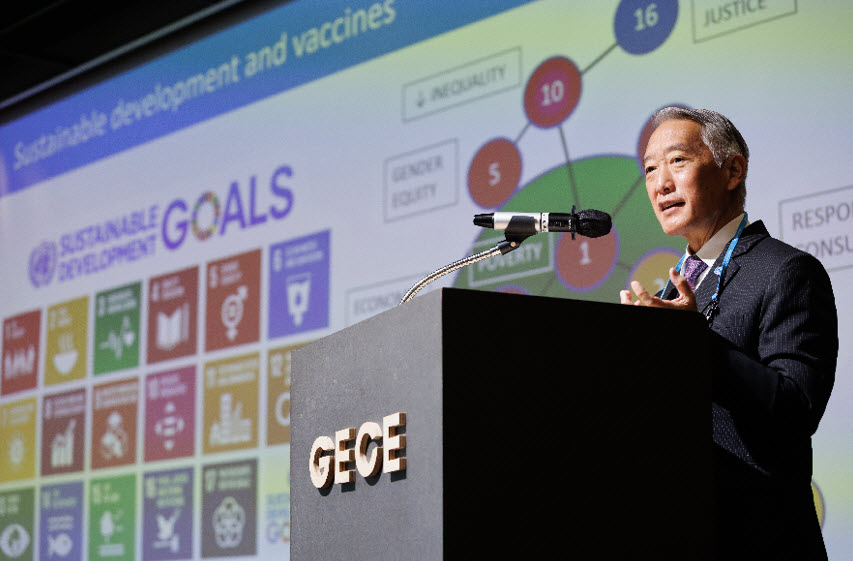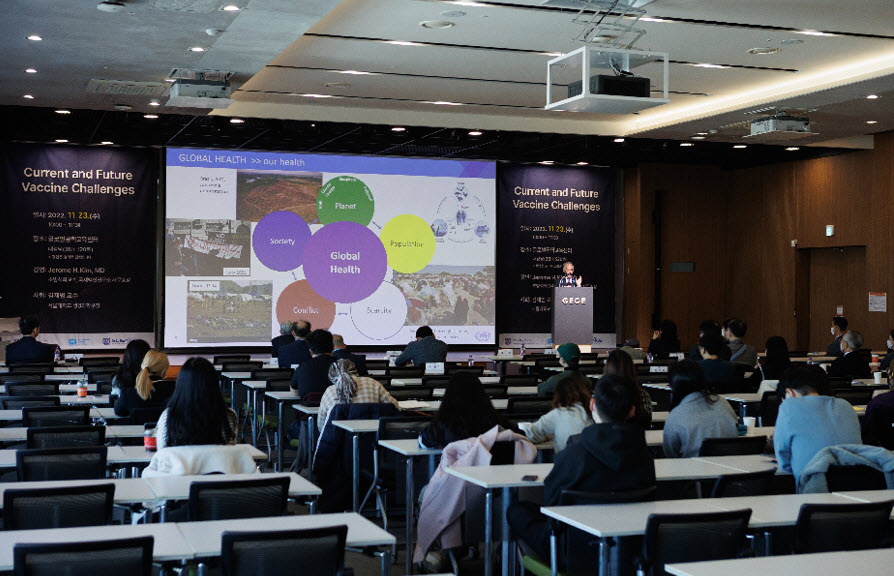On November 23, the SNU Office of Research Affairs invited distinguished professor Jerome H. Kim to give a lecture on the importance of vaccines and the challenges faced in achieving global vaccination. Titled “Current and Future Vaccine Challenges,” the lecture sought to address the difficulties encountered in vaccine development and delivery that were brought to light by the COVID-19 pandemic. In an age where public health challenges and societal issues become increasingly interconnected, Professor Kim’s lecture provided valuable insights that highlighted the central challenges that must be overcome.

“Current and Future Vaccine Challenges” by Distinguished Professor Jerome H. Kim
Professor Kim began the lecture by commenting on the status of global health in our society. Referencing the United Nations Sustainable Development Goals (SDGs), he highlighted the significance of global health by stating that it was connected to all 17 SDGs and the problems that the world faces ranging from political to environmental. Five challenges were emphasized as factors that exacerbate global health problems: politics and leadership in society, the biosphere, population, scarcity, and conflict. Deforestation in the Amazon rainforest, for example, is a problem in the biosphere that worsens prospects for global health as closer interaction between humans and wildlife give rise to disease transmission. Global health issues can be viewed from diverse perspectives, providing research opportunities for scholars in various academic fields.
Professor Kim emphasized vaccination as a prerequisite for ensuring global health. There are, however, major obstacles to vaccine development and widespread vaccination. Ten of these challenges were addressed in the lecture. These included time-consuming bureaucratic procedures, mismatches in vaccine demand and supply, and unequal access to vaccines. Out of all the addressed challenges, the problem of funding stood out as the root cause of the other constraints. For example, many companies are unable to advance their research from preclinical to clinical because of a lack of funds. Governments, especially those of low-income countries, are unwilling to spend their scarce resources on vaccines due to the low possibility of getting a return on their investments. For the same reason, many major pharmaceutical companies are unwilling to invest in vaccine development, as the possibility of successfully developing a vaccine and generating a profit is low compared to the high costs involved. To tackle these challenges in funding, Professor Kim highlighted the importance of strengthening a global mechanism such as COVAX that aims to promote global vaccine development and distribution.
Of course, there are already organizations that work on improving vaccine research and distribution. Professor Kim highlighted Gavi as one such organization. Gavi is a global alliance that purchases vaccines and distributes them to countries at an affordable price. Their work has allowed 80% of children born globally to be vaccinated with standard child-recommended PRRS (Porcine Respiratory and Reproductive Syndrome) vaccines. There is more work to be done, however. Many middle-income countries have a GDP that is too high to qualify for Gavi subsidies. “The biggest gap with unvaccinated children globally is not low-income countries, as Gavi is taking care of them, but middle-income countries. This is an opportunity for companies with high-quality vaccines approved by WHO to enter the Southeast Asian market and collaborate with governments to provide cheaper access to vaccines,” Professor Kim said, highlighting the need for vaccine companies and global alliances to overcome this imbalance.

Professor Jerome H. Kim is giving a lecture
After addressing the current challenges in vaccine research and delivery, Professor Kim concluded his lecture by introducing the International Vaccine Institute (IVI). Founded in 1997, IVI aims for a future where developing countries no longer suffer from infectious diseases. Working with 39 nations and the WHO, their mission is to discover, develop, and deliver safe, effective, and affordable vaccines for global public health. With its headquarters located at SNU, IVI has offices in Sweden and Austria where funding is provided that allows the organization to work with African nations in vaccine research and development.
IVI collaborates extensively with SNU to extend its research and educate students about the necessity of vaccines. Numerous joint research projects are conducted between IVI and SNU colleges, and with the help of IVI, a vaccinology course was offered at the SNU Graduate School of Public Health to give students a comprehensive basic understanding and knowledge of contemporary vaccinology. SNU Hospital has also been able to conduct MERS and COVID-19 vaccine clinical trials with IVI sponsorship. “If you think of something that we could collaborate on, we are happy to listen,” he said, opening possibilities for new and extended cooperation between the two institutions.
In the following Q&A session, Professor Kim revealed that he plans to offer a new course in Applied Immunology. “It relates to vaccines and there are some key questions in immunology that have yet to be answered that might provide insight into further vaccine research.”
Professor Kim is the current director general of IVI. As an expert on vaccine development and a world-renowned scholar in the field of viruses and infectious diseases, his lecture highlighted many implications that the status of vaccines in the world brings to the issue of global health. His lecture provided a valuable opportunity for SNU to review and develop its vaccine research capabilities.
Written by Yeryoung Lee, SNU English Editor, yeryounglee@snu.ac.kr
Reviewed by Professor Travis Smith, Department of Asian Languages and Civilizations, tlsmith@snu.ac.kr

